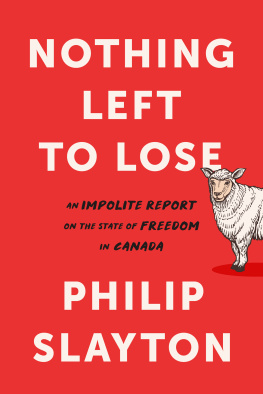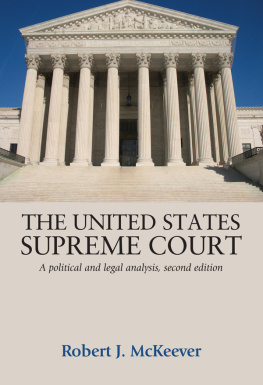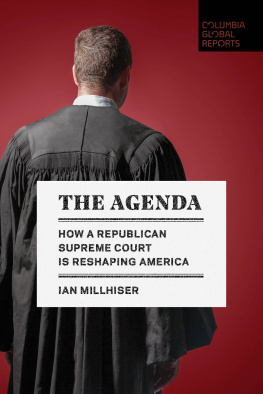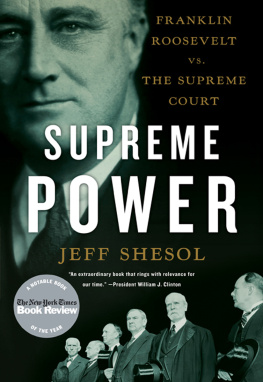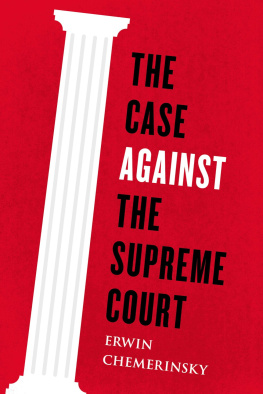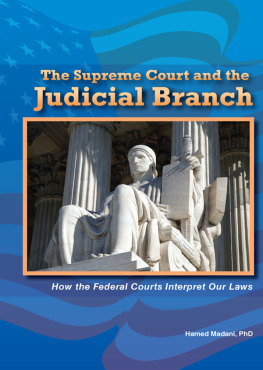MIGHTY
JUDGMENT
ALSO BY PHILIP SLAYTON
Lawyers Gone Bad:
Money, Sex and Madness in Canadas Legal Profession
PHILIP SLAYTON
MIGHTY
JUDGMENT
HOW THE
SUPREME COURT OF CANADA
RUNS YOUR LIFE

ALLEN LANE CANADA
Published by the Penguin Group
Penguin Group (Canada), 90 Eglinton Avenue East, Suite 700, Toronto, Ontario, Canada M4P 2Y3
(a division of Pearson Canada Inc.)
Penguin Group (USA) Inc., 375 Hudson Street, New York, New York 10014, U.S.A.
Penguin Books Ltd, 80 Strand, London WC2R 0RL, England
Penguin Ireland, 25 St Stephens Green, Dublin 2, Ireland (a division of Penguin Books Ltd)
Penguin Group (Australia), 250 Camberwell Road, Camberwell, Victoria 3124, Australia
(a division of Pearson Australia Group Pty Ltd)
Penguin Books India Pvt Ltd, 11 Community Centre, Panchsheel Park, New Delhi 110 017, India
Penguin Group (NZ), 67 Apollo Drive, Rosedale, North Shore 0632, New Zealand
(a division of Pearson New Zealand Ltd)
Penguin Books (South Africa) (Pty) Ltd, 24 Sturdee Avenue, Rosebank, Johannesburg 2196,
South Africa
Penguin Books Ltd, Registered Offices: 80 Strand, London WC2R 0RL, England
First published 2011
1 2 3 4 5 6 7 8 9 10 (RRD)
Copyright Philip Slayton, 2011
Tower of Song
Written by Leonard Cohen
Stranger Music In. (BMI)/Sony/ATV Music Publishing Canada (SOCAN)
All rights reserved. Used by permission.
How Judges Think
Excerpts reprinted by permission of the publisher from HOW JUDGES THINK by Richard A. Posner, 8, 11, 81, 82, 125, 151, 286, 306, Cambridge, Mass.: Harvard University Press, Copyright 2008 by the President and Fellows of Harvard College.
All rights reserved. Without limiting the rights under copyright reserved above, no part of this publication may be reproduced, stored in or introduced into a retrieval system, or transmitted in any form or by any means (electronic, mechanical, photocopying, recording or otherwise), without the prior written permission of both the copyright owner and the above publisher of this book.
Manufactured in the U.S.A.
LIBRARY AND ARCHIVES CANADA CATALOGUING IN PUBLICATION
Slayton, Philip
Mighty judgment : how the Supreme Court of Canada runs your life / Philip Slayton.
Includes bibliographical references and index.
ISBN 978-0-670-06927-9
1. Canada. Supreme Court. 2. Political questions and judicial
powerCanada. 3. Judicial reviewCanada. 4. Canada. Supreme
CourtBiography. 5. JudgesSelection and appointmentCanada.
I. Title. II. Title: How the Supreme Court of Canada runs your life.
KE8244.S52 2011 347.71035 C2011-900466-6
KF8764.ZA2S52 2011
Visit the Penguin Group (Canada) website at www.penguin.ca
Special and corporate bulk purchase rates available; please see
www.penguin.ca/corporatesales or call 1-800-810-3104, ext. 2477 or 2474
FOR RAYMOND AND VALERIE
THERES A MIGHTY JUDGEMENT COMING,
BUT I MAY BE WRONG
YOU SEE, YOU HEAR THESE FUNNY VOICES
IN THE TOWER OF SONG
Leonard Cohen, Tower of Song
MIGHTY
JUDGMENT
INTRODUCTION

The Voice Passed Down from the Mountain
T erri-Jean
In the fall of 2009, a lawyer for Bedford and two other sex workers argued in a Toronto courtroom that laws limiting sex-trade workers ability to protect themselves were contrary to section 7 of the Canadian Charter of Rights and Freedoms. The federal government appealed her decision to the Court of Appeal for Ontario. Whatever happens there, it is widely accepted that the case will eventually move on to the Supreme Court of Canada.
Should all that goes with prostitution be legal in Canada? What is the role of the law in regulating morality? These questions will finally be settled, far away from Terri-Jean Bedfords suburban bondage bungalow, by the Supreme Court sitting in a magisterial and remote courtroom in the severe city of Ottawa. Nine largely unknown and unelected elite lawyers, of unquestioned sobriety and impeccable careers, will decide what to do about sex workers. The chances are good that the Right Honourable Beverley McLachlin will still be chief justice when that happens. And the indomitable Terri-Jean Bedford may be in the courtroom too. In a strange turn of events, the Charter of Rights will have brought together two women from very different worlds, dominatrix and chief justice.
That fall, while sex laws were being discussed in a Toronto courtroom, a question of an entirely different kind landed in the Supreme Courts lap. On October 16, 2009, Justice Minister Ron Nicholson announced that the federal government would ask the court whether the government had the constitutional power to create a national securities regulator. This superficially dry and technical question is intensely political, with some provinces notably Quebec and Albertadetermined to hang on to their provincial securities commissions. One newspaper report predicted, Quebec will react with fury. Premier Jean Charest will howl. That howl will be echoed in Alberta
Bondage and bonds, passion and politics: just about every question we care about ends up at the Supreme Court of Canada, the most important but least known branch of our government.

This means that reform of the court is easy, at least in principle. And there should be reform, as I propose in this books Conclusion.
The Supreme Court Act provides for a chief justice and eight other judges, appointed to serve until age seventy-five by the Governor in Council (which is legal-speak for the cabinet, and which, in reality, means the prime minister acting alone). Three of the judges must be from Quebec; there are no other geographic requirements in the Act, although a convention has developed of having three judges from Ontario, one from the Atlantic provinces, one from the Prairies, and one from British Columbia. The court must agree to hear an appeal (there are limited exceptions to this requirement in certain criminal law matters when the court must hear an appeal whether it wants to or not). Section 40 of the Act says that leave should be granted when the court is of the opinion that any question involved is, by reason of its public importance or the importance of any issue of law or any issue of mixed law and fact involved in that question, one that ought to be decided by the Supreme Court Section 53 permits the federal government to ask the court for what is, in effect, a legal opinion on certain important questions of law or fact (this is the provision under which the government asked for an opinion on a national securities regulator).
Some have argued that neither court is as important as some people think, and that both are growing less important day by day; the big decisions, so the argument goes, are made elsewhere. Others have said that Canadian Supreme Court judges have become lazy. I dont agree with either suggestion. Our Supreme Court justices are the most important decision-makers in Canada, and, as befits Canadians with such grave responsibilities, they are working away like beavers.

Who are the judges of the Supreme Court? One of the best answers comes from Dahlia Lithwick, a former Canadian who writes on U.S. legal matters. Lithwick wrote of the Canadian Supreme Court, The justices include all sorts of quirky outliers, including women, people with French accents, and men with fantastic hair. Few Canadians could be so precise and accurate about their court.
Next page


